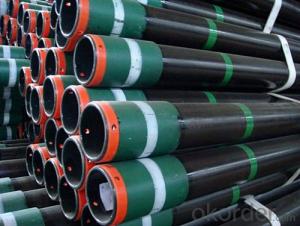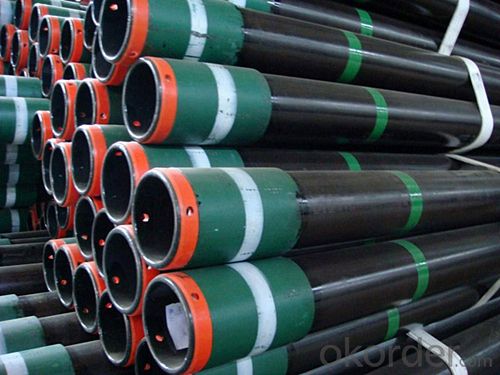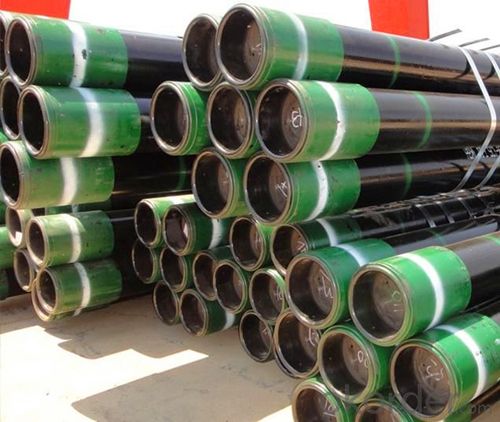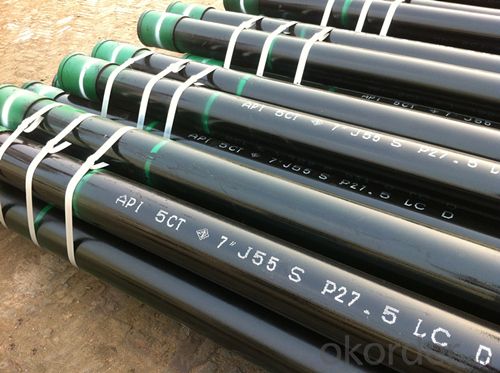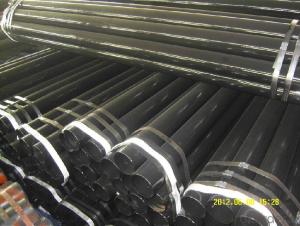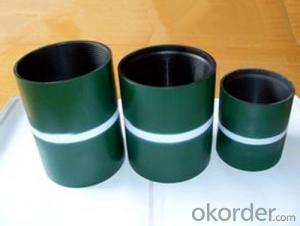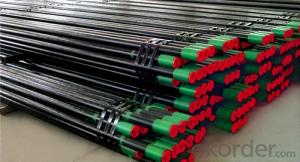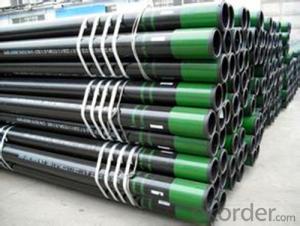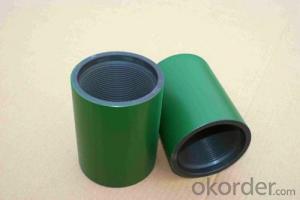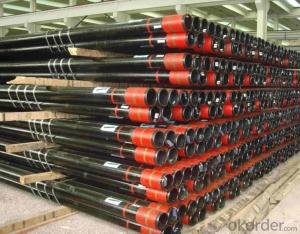Casing Pipe of Grade J55 with API Standard
- Loading Port:
- Qingdao
- Payment Terms:
- TT OR LC
- Min Order Qty:
- 20 m.t.
- Supply Capability:
- 2000 m.t./month
OKorder Service Pledge
OKorder Financial Service
You Might Also Like
1. Structure of Casing Pipe of Grade J55 Description
API 5CT Steel Pipe, J55 Oil/Petroleum Casing Pipe, OCTG
1) Grade: J55
2) Size: 4 1/2", 5", 5 1/2", 6 5/8", 7", 7 5/8", 9 5/8", 10 3/4", 13 3/8", 16", 18 5/8", 20"
3) Wall thickness: 6.35 - 12.70 mm
4) Thread type: STC, LTC, BTC
5) Length: R1,R2,R3
6) All our casings accord with API 5CT standard.
2. Main Features of Casing Pipe of Grade J55
1) Advanced test for quality
2) MTC, COC provided
3) Supervision is welcome
3. Casing Pipe of Grade J55 Images
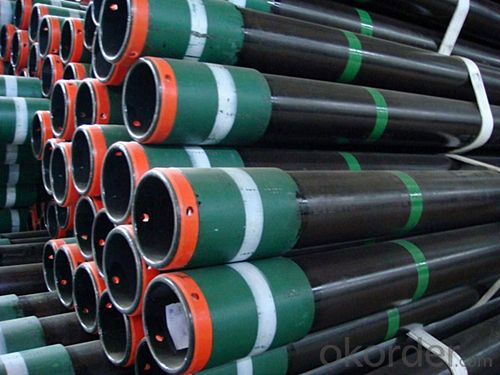
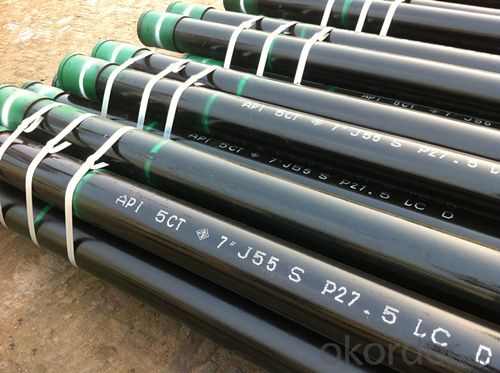
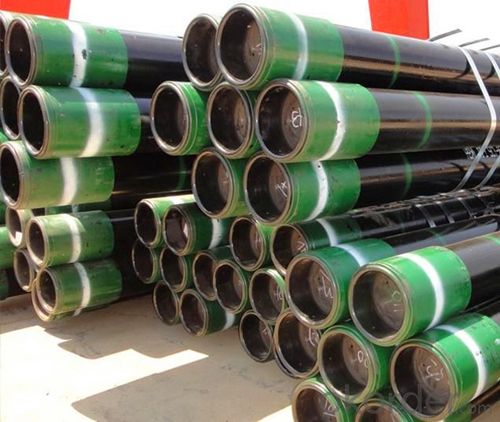
4. Casing Pipe of Grade J55 Specification
Size Destination | Weight Destination | Outside Diameter | Wall Thickness | Type of End Finish | ||||||
Grade | ||||||||||
in | mm | in | mm | J55 | L80 | N80 | C90 | P110 | ||
4 1/2 | 9.50 | 4.500 | 114.3 | 0.205 | 5.21 | PS | - | - | - | - |
10.50 | 0.224 | 5.69 | PSB | - | - | - | - | |||
11.60 | 0.250 | 6.35 | PSLB | PLB | PLB | PLB | PLB | |||
13.50 | 0.290 | 7.37 | - | PLB | PLB | PLB | PLB | |||
15.10 | 0.337 | 9.56 | - | - | - | - | PLB | |||
5 | 11.50 | 5.00 | 127.00 | 0.220 | 5.59 | PS | - | - | - | - |
13.00 | 0.253 | 6.43 | PSLB | - | - | - | - | |||
15.00 | 0.296 | 7.52 | PSLB | PLB | PLB | PLBE | PLB | |||
18.00 | 0.362 | 9.19 | - | PLB | PLB | PLBE | PLB | |||
21.40 | 0.437 | 11.10 | - | PLB | PLB | PLB | PLB | |||
23.20 | 0.478 | 12.14 | - | PLB | ||||||
24.10 | 0.500 | 12.70 | - | PLB | ||||||
5 1/2 | 14.00 | 5.500 | 139.7 | 0.244 | 6.20 | PS | - | - | - | - |
15.50 | 0.275 | 6.98 | PSLB | - | - | - | - | |||
17.00 | 0.304 | 7.72 | PSLB | PLB | PLB | PLBE | PLB | |||
20.00 | 0.361 | 9.17 | - | PLB | PLB | PLBE | PLB | |||
23.00 | 0.415 | 10.54 | - | PLB | PLB | PLBE | PLB | |||
6 5/8 | 20.00 | 6.625 | 168.28 | 0.288 | 7.32 | PSLB | - | - | - | - |
24.00 | 0.352 | 8.94 | PSLB | PLB | PLB | PLBE | PLB | |||
28.00 | 0.417 | 10.59 | - | PLB | PLB | PLBE | PLB | |||
32.00 | 0.475 | 12.06 | - | PLB | PLB | PLBE | PLB | |||
7 | 17.00 | 7.00 | 177.80 | 0.231 | 5.87 | - | - | - | - | - |
20.00 | 0.272 | 6.91 | PS | - | - | - | - | |||
23.00 | 0.317 | 8.05 | PSLB | PLB | PLB | PLBE | - | |||
26.00 | 0.362 | 9.19 | PSLB | PLB | PLB | PLBE | PLB | |||
29.00 | 0.408 | 10.36 | - | PLB | PLB | PLBE | PLB | |||
32.00 | 0.453 | 11.51 | - | PLB | PLB | PLBE | PLB | |||
35.00 | 0.498 | 12.65 | - | PLB | PLB | PLBE | PLB | |||
38.00 | 0.540 | 13.72 | - | PLB | PLB | PLBE | PLB | |||
7 5/8 | 24.00 | 7.625 | 193.68 | 0.300 | 7.62 | - | - | - | - | - |
26.40 | 0.328 | 8.33 | PSLB | PLB | PLB | PLBE | PLB | |||
29.70 | 0.375 | 9.52 | - | PLB | PLB | PLBE | PLB | |||
33.70 | 0.430 | 10.92 | - | PLB | PLB | PLBE | PLB | |||
39.00 | 0.500 | 12.70 | - | PLB | PLB | PLBE | PLB | |||
42.80 | 0.562 | 14.27 | - | PLB | PLB | PLB | PLB | |||
45.30 | 0.595 | 15.11 | - | PLB | PLB | PLB | PLB | |||
47.10 | 0.625 | 15.88 | - | PLB | PLB | PLB | PLB | |||
8 5/8 | 24.00 | 8.625 | 219.08 | 0.264 | 6.71 | PS | - | - | - | - |
28.00 | 0.304 | 7.72 | - | - | - | - | - | |||
32.00 | 0.352 | 8.94 | PSLB | - | - | - | - | |||
36.00 | 0.400 | 10.16 | PSLB | PLB | PLB | PLBE | PLB | |||
40.00 | 0.450 | 11.43 | - | PLB | PLB | PLBE | PLB | |||
44.00 | 0.500 | 12.70 | - | PLB | PLB | PLBE | PLB | |||
49.00 | 0.557 | 14.15 | - | PLB | PLB | PLBE | PLB | |||
9 5/8 | 32.30 | 9.625 | 244.48 | 0.312 | 7.92 | - | - | - | - | - |
36.00 | 0.352 | 8.94 | PSLB | - | - | - | - | |||
40.00 | 0.395 | 10.03 | PSLB | PLB | PLB | PLBE | - | |||
43.50 | 0.435 | 11.05 | - | PLB | PLB | PLBE | PLB | |||
47.00 | 0.472 | 11.99 | - | PLB | PLB | PLBE | PLB | |||
53.50 | 0.545 | 13.84 | - | PLB | PLB | PLBE | PLB | |||
58.40 | 0.595 | 15.11 | - | PLB | PLB | PLB | PLB | |||
10 3/4 | 32.75 | 10.75 | 273.05 | 0.279 | 7.09 | - | - | - | - | - |
40.50 | 0.350 | 8.89 | PSB | - | - | - | - | |||
15.50 | 0.400 | 10.16 | PSB | - | - | - | - | |||
51.00 | 0.450 | 11.43 | PSB | PSB | PSB | PSBE | PSB | |||
55.50 | 0.495 | 12.57 | - | PSB | PSB | PSBE | PSB | |||
60.70 | 0.545 | 13.84 | - | - | - | PSBE | PSB | |||
65.70 | 0.595 | 15.11 | - | - | - | PSB | PSB | |||
13 3/8 | 48.00 | 13.375 | 339.73 | 0.330 | 8.38 | - | - | - | - | - |
54.50 | 0.380 | 9.65 | PSB | - | - | - | - | |||
61.00 | 0.430 | 10.92 | PSB | - | - | - | - | |||
68.00 | 0.480 | 12.19 | PSB | PSB | PSB | PSB | PSB | |||
72.00 | 0.514 | 13.06 | - | PSB | PSB | PSB | PSB | |||
16 | 65.00 | 16 | 406.40 | 0.375 | 9.53 | - | - | - | - | - |
75.00 | 0.438 | 11.13 | PSB | - | - | - | - | |||
84.00 | 0.495 | 12.57 | PSB | - | - | - | - | |||
109.00 | 0.656 | 16.66 | P | P | P | - | P | |||
18 5/8 | 87.50 | 18.625 | 473.08 | 0.435 | 11.05 | PSB | - | - | - | - |
20 | 94.00 | 20 | 508.00 | 0.438 | 11.13 | PSLB | - | - | - | - |
106.50 | 0.500 | 12.70 | PSLB | - | - | - | - | |||
133.00 | 0.635 | 16.13 | PSLB | - | - | - | - | |||
5. FAQ of Casing Pipe of Grade J55
We have organized several common questions for our clients,may help you sincerely:
①How about your company?
One of the leading manufacturers and suppliers specializing in steel pipe products in China, mainly offering four series steel pipes including welded steel pipe (ERW, SSAW, LSAW and square and rectangle pipe), seamless steel pipe, hot dipped galvanized steel pipe and steel pipe with 3 layer polythene coating. We can provide customers different specification standards e.g. ASTM A53, ASTM A106, BS1387, API 5L, API 5CT, ISO3183 and etc. Our scope of supplying covers from 1/2" to 48" for the outside diameter of welded pipes, and 1/8" to 20" for the seamless pipes.
Other than steel pipes we are also capable of supplying a wide variety of pipeline accessories, steel pipe fittings; valves etc. consists of our one-stop sales. The integrated sales & service ensures customers with various demands an easier access for purchasing management.
②How to guarantee the quality of the products?
We have established the international advanced quality management system,every link from raw material to final product we have strict quality test;We resolutely put an end to unqualified products flowing into the market. At the same time, we will provide necessary follow-up service assurance.
③How long can we receive the product after purchase?
In the purchase of product within three working days, We will arrange the factory delivery as soon as possible.
- Q: What is the thermal conductivity of steel pipes?
- The thermal conductivity of steel pipes can vary depending on the specific type of steel used and its composition. However, on average, the thermal conductivity of steel pipes is around 50-60 watts per meter-kelvin (W/mK). This means that steel pipes are relatively good conductors of heat, allowing for efficient transfer of thermal energy. The high thermal conductivity of steel pipes makes them suitable for various applications, including heating systems, industrial processes, and infrastructure projects where heat transfer is essential.
- Q: Can steel pipes be used for conveying compressed air?
- Yes, steel pipes can be used for conveying compressed air. Steel pipes are commonly used in applications where high pressure and durability are required, such as in industrial settings. Steel pipes have a high tensile strength and can withstand the high pressures generated by compressed air systems. Additionally, steel pipes are resistant to corrosion, which is important when dealing with moisture in compressed air. However, it is important to ensure that the steel pipes are properly sized and rated for the specific pressure and flow requirements of the compressed air system. Additionally, proper installation and maintenance practices should be followed to prevent any potential leaks or failures.
- Q: Can steel pipes be insulated for thermal efficiency?
- Steel pipes can indeed be insulated to enhance their thermal efficiency. By insulating steel pipes, heat loss or gain can be minimized, depending on the specific purpose. Typically, the insulation material is wrapped around the pipes, creating a protective barrier. This barrier effectively prevents heat transfer between the pipes and the surrounding environment. As a result, the energy required to heat or cool the fluid flowing through the pipes is significantly reduced, leading to improved energy efficiency. This practice is widely employed in industries such as HVAC, oil and gas, and industrial processes, where precise temperature control is crucial. Moreover, insulation also serves to prevent condensation and corrosion on the outer surface of the pipes. All in all, insulating steel pipes is a cost-effective measure that enhances thermal efficiency and reduces energy consumption.
- Q: Can steel pipes be used for underground sprinkler systems?
- Yes, steel pipes can be used for underground sprinkler systems. However, it is important to note that steel pipes are not as commonly used as other materials like PVC or polyethylene due to their susceptibility to corrosion. If steel pipes are chosen for this application, they should be coated or lined to protect them from underground moisture and ensure their longevity.
- Q: How are steel pipes used in fire protection systems?
- Fire protection systems rely on the inclusion of steel pipes, which serve as an essential component for the distribution of water and fire suppressants within buildings. These pipes are renowned for their robustness, longevity, and ability to endure extreme temperatures, rendering them optimal for withstanding the harsh conditions associated with fires. Within fire protection systems, steel pipes are commonly utilized to establish an interconnected network of pipes responsible for supplying water to sprinkler heads or fire hydrants throughout a building. This network guarantees that water is readily accessible to suppress or extinguish fires during emergencies. One of the primary advantages of steel pipes in fire protection systems is their capacity to withstand the elevated pressure and flow rates necessary for effective fire suppression. Steel pipes can handle forceful water flow with ease, enabling prompt and efficient distribution of water to affected areas, thereby aiding in the control and extinguishing of fires in the shortest possible time. Additionally, steel pipes possess an inherent resistance to corrosion, a crucial attribute for preserving the integrity of fire protection systems over time. Corrosion has the potential to weaken pipes, leading to leaks or complete failure, which can prove catastrophic during a fire incident. However, steel pipes possess an extended lifespan and require minimal maintenance when compared to other pipe materials, ensuring the longevity and dependability of the system for many years to come. Moreover, steel pipes are frequently selected for use in fire protection systems due to their fire-resistant properties. Steel inherently possesses the ability to withstand high temperatures without deformation or compromising its structural integrity. This characteristic is of utmost importance in fire protection systems, as it enables the pipes to remain intact and continue delivering water even amidst a fire, ensuring the safety of occupants and minimizing damage to the building. In conclusion, steel pipes hold a pivotal role in fire protection systems by guaranteeing the reliable and efficient distribution of water or fire suppressants. Their strength, durability, resistance to high temperatures, and corrosion resistance make them the ideal choice for effectively combating fires and safeguarding lives and property.
- Q: How are steel pipes used in the construction of bridges?
- Steel pipes are commonly used in the construction of bridges as they provide structural support and stability. They are often used as piers or columns to bear the weight of the bridge deck and transfer the load to the foundation. Additionally, steel pipes are used for the construction of bridge railings and barriers, providing safety for pedestrians and vehicles. Overall, steel pipes offer durability, strength, and flexibility, making them an essential component in bridge construction.
- Q: Are steel pipes suitable for potable water applications?
- Yes, steel pipes are suitable for potable water applications. They are commonly used in water distribution systems due to their durability, strength, and resistance to corrosion. However, proper coating and lining techniques should be employed to ensure the water remains safe for consumption and to prevent any potential leaching of contaminants from the pipe material.
- Q: Can steel pipes be used for conveying solid materials?
- Yes, steel pipes can be used for conveying solid materials. Steel pipes are known for their durability and strength, making them suitable for transporting various solid materials such as ores, grains, coal, and construction materials. The smooth interior of steel pipes allows for efficient flow and minimal friction, making them a preferred choice in industries like mining, agriculture, and construction.
- Q: What are the standard dimensions and weight of steel pipes?
- The standard dimensions and weight of steel pipes can vary depending on the specific type and grade of steel pipe being used. However, common standard dimensions for steel pipes include sizes ranging from 1/8 inch to 48 inches in diameter, with wall thicknesses ranging from Schedule 5 to Schedule 160. As for weight, it also depends on the diameter and wall thickness, but a general guideline is that a 1-inch diameter steel pipe with a 1/4 inch wall thickness weighs approximately 1.02 pounds per foot. It is important to note that these dimensions and weights can vary based on the specific standards and requirements set by different industries and applications.
- Q: Can steel pipes be used for oil refineries?
- Yes, steel pipes are commonly used in oil refineries due to their high strength, durability, and resistance to corrosion, making them suitable for transporting various petroleum products and chemicals within the refinery infrastructure.
Send your message to us
Casing Pipe of Grade J55 with API Standard
- Loading Port:
- Qingdao
- Payment Terms:
- TT OR LC
- Min Order Qty:
- 20 m.t.
- Supply Capability:
- 2000 m.t./month
OKorder Service Pledge
OKorder Financial Service
Similar products
Hot products
Hot Searches
Related keywords
